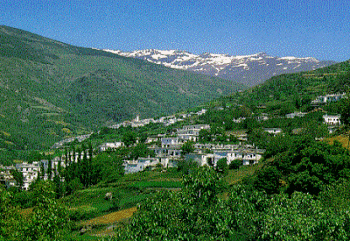 The James Hutton Institute
The James Hutton Institute
This page is no longer updated. The Macaulay Land Use Research Institute joined forces with SCRI on 1 April 2011 to create The James Hutton Institute.
The LSIRD wishes to thank all of the participants for the considerable efforts they went to to make the Granada meeting a great success.
 |
|
The Granada workshop was set up to consider where current trends in the evolution of EU rural policies are leading, and what the implications of this will be for LFA livestock systems. This was the first of the four focused workshops that will together examine the full range of the key processes that will shape the future course of LFA animal production.
Given the total reliance of the LFA agricultural sector on the CAP, future reforms are likely to have a profound effect on the economic environment in which farmers will have to operate. The European Commission is keen that the CAP evolves into a broad policy of rural development. It is also clear that it is no longer acceptable that money should be spent on assisting a farming industry which does not take due account of environmental factors. Instead, the taxpayer is increasingly prepared to pay for sound environmental protection by creating economic incentives for environmentally acceptable agriculture and alternative farming methods, such as organic production.
Such philosophy is likely to play an increasing part in the thinking behind all rural policy reforms, but particularly in the LFAs, where agriculture is less productive, and landscape values tend to be higher.
The workshop, hosted by Dr Javier Calatrava of the “Centro de Investigación y Desarollo Agraria, Granada, considered a range of factors currently acting on policy reform in the EU. The main ongoing processes were considered to be the WTO negotiations, the incorporation of Eastern European countries into the CAP, Integrated Rural Development, and the demands for increased emphasis in the environmental management role of agriculture.
The papers presented in Granada demonstrated the very strong pressure that is being exerted on the EU to end production-linked subsidies by the WTO - the so-called “blue box” payments. It was felt likely that we will see a situation in which withdrawal of price support mechanisms will lead to falling commodity prices in the beef and sheep sectors, with compensatory payments being increased, either as regional assistance programmes, environmental programmes or de-coupled income support. Whichever of these routes is chosen it is likely to reduce any incentive to intensify grazing systems.
A key issue is the extent to which compensatory payments will be sufficient to alleviate the trend in many parts of Europe to the abandonment of land. A broadening of the CAP to incorporate a wide range of rural activities will have the result of decreasing the total amount available to farmers, though should help to provide more opportunities for alternative part-time employment.
The CAP itself will be severely strained by the incorporation of between four and ten of the countries of Eastern Europe from about 2003. The incorporation of these countries may make it necessary to re-categorise the west-Europe LFAs, and the increased diversity in agricultural activity will make it necessary for the CAP to concentrate on basic objectives and focus funding more accurately on sectors in need.
Finally, it is becoming increasingly accepted that farming activities will be obliged to deliver more environmental benefits than at present. Cross-compliance of agricultural support, and the extension of agri-environmental measures such as 2078/92, and the possible linking of 2078 with LFA payments will encourage more environmentally sensitive systems of grazing livestock, and in particular an increase in organic systems.
Interdisciplinary research should focus on actions and measures which will stimulate enterprise and business expansion in farming, industry and services. Such research should attempt to identify the essential elements of a Farm Development Package suitable for the majority of farmers in vulnerable areas. In addition research is required to examine mechanisms for positive discrimination in favour of the location and dispersal of industry, commercial and other services and housing, in or within the hinterland of less favoured rural areas.
